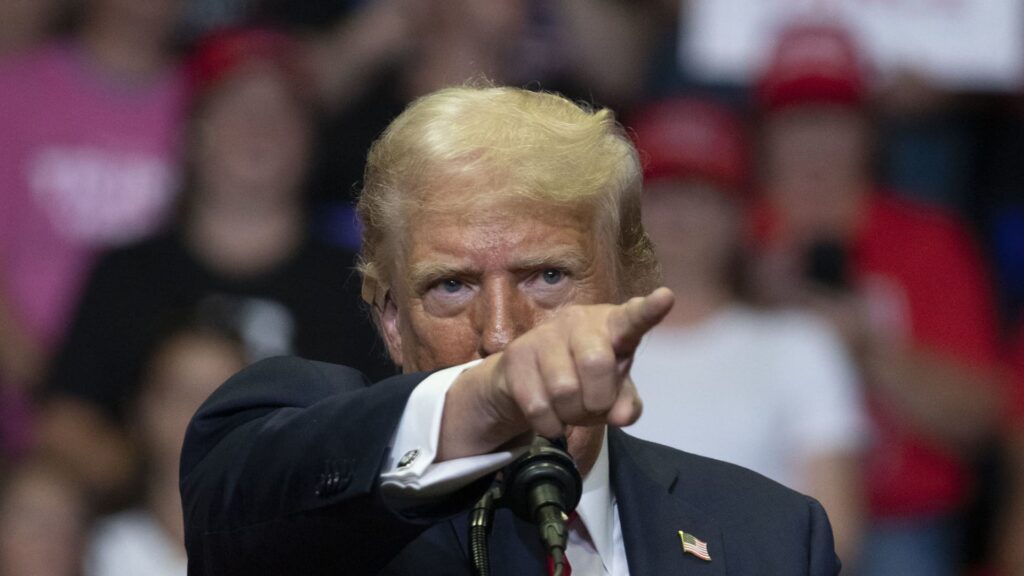Republican presidential candidate and former President Donald J. Trump holds a campaign rally at Van Andel Arena on July 20, 2024 in Grand Rapids, Michigan.
Bill Pugliano | Getty Images News | Getty Images
Experts told CNBC that if former President Trump is elected to a second term in the White House, he may take his trade war and economic decoupling policies to the next level.
While Joe Biden has also put strategic competition with China at the forefront of his economic policies, economists and trade experts widely expect Trump to further cut and undermine trade relations between the world’s two largest economies.
Eswar Prasad, an economics professor at Cornell University, said: “Trump’s victory is likely to intensify trade and economic hostilities between the United States and China, thereby exacerbating the trade and financial decoupling between the two countries.”
Trump is widely expected to face off against current Vice President Kamala Harris after Biden dropped out of the race and endorsed her. Prasad and other experts said Harris’ approach to China could be similar to Biden’s.
Prasad, who previously served as head of the International Monetary Fund’s China and Financial Research Department, explained that while both Trump and Biden have taken a protectionist stance, their strategies and tactics are very different.
“Trump relied on tariffs to block imports from China. While keeping these tariffs unchanged and even raising tariffs on some imported products, Biden focused more on restricting China’s access to technology transfer and computer chips,” he said.
“Customers”
Trump’s biggest shift from Biden-era trade policy may be the imposition of tariffs on China.
The self-proclaimed “Tariff Man” sparked a trade war with Beijing during his first term. He imposed a series of tariffs on $250 billion worth of Chinese imports, ignoring warnings that the tariffs would raise prices and harm consumers.
After defeating Trump in 2020, Biden retained the tariffs of his predecessor and even increased his own, announcing strict new tariffs on approximately $18 billion worth of Chinese imports, including electric vehicles, solar cells, lithium batteries, and steel. and aluminum.
Experts told CNBC they expect Harris to largely continue Biden’s tariff policies. On the other hand, Trump has proposed increasing tariffs on Chinese imports by at least 60%.
“I certainly don’t know whether Trump is willing to take such extreme measures, but I do believe he will probably increase tariffs to some extent in his second term,” said Stephen Weymouth, a professor of international political economy at Georgetown University.
Economist Stephen Roach said that raising tariffs during Trump’s second term would amount to the “nuclear option” in an international economic conflict.

William Reinsch, chair of international business at the Center for Strategic and International Studies, said the tariffs could trigger another trade war that would end most exchanges of goods between the two countries and impose “huge economic costs.”
Reinsch said even if Trump’s goal was not to decouple completely but to force Beijing to negotiate a more favorable trade deal, there was no reason to believe that would work.
The Trump administration reached a “Phase One trade deal” with China in 2019, but few terms were fulfilled and subsequent phases never materialized.
Some commentators said Trump’s selection of J.D. Vance as his running mate is further evidence that Republicans are serious about his tariff plans. The senator from Ohio has been a staunch supporter of tariffs on China, viewing China as the biggest threat facing the United States.
“If I were a Chinese policymaker, this would be a choice that would alarm me,” said Arthur Dong, a professor of strategy and economics at Georgetown University.
technology war

Perhaps Biden’s biggest move was the Administration’s signing of the Chip and Science Act in August 2022, which earmarked nearly $53 billion to invest in domestic semiconductor manufacturing and research to increase U.S. competitiveness against China.
Chris Miller, author of “Chip Wars,” noted that the export controls and CHIPS bills were passed with bipartisan support in Washington, so no matter what happens in November, such policies will likely remain a priority.
“I expect that no matter who wins the election, the U.S. will move up a level or two of restrictions,” Miller said.
diplomatic
Rory Daniels, executive director of the Asia Society Policy Institute, said a second Trump term would also affect U.S. diplomacy and dialogue with Beijing beyond trade matters.
She said the channels for the two countries to discuss policy issues were significantly reduced during the Trump administration, while the Biden administration emphasized diplomatic engagement efforts.
The current government has also sought greater coordination with “like-minded partners,” such as lobbying Japan and the Netherlands to cooperate on semiconductor restrictions.

“Not only does this help minimize the backlash to his trade policy actions, it also makes them more effective in many ways,” said Nick Marrow, chief global trade analyst at the Economist Intelligence Unit. He added that he Any future Democratic administration is expected to retain this multilateral approach.
On the other hand, he said that Trump chose a more “go it alone” approach, allowing the United States to take measures against China faster.
While the Biden-Harris administration’s “more measured and cautious” approach to China trade and diplomacy has played a greater role in stabilizing relations, Marrow said he doubted Beijing was excited about either candidate .
“There’s a sense that U.S.-China relations will continue to be in disintegration for the rest of this decade, no matter which party is in the White House.”
—CNBC’s Zenith Wong contributed to this report

